Extract from Corporate Sustainability & Responsibility, by Wayne Visser
BP Case Study [Pdf download]

Writer, Speaker, Academic and Poet – Purpose Inspired for a Better World
Extract from Corporate Sustainability & Responsibility, by Wayne Visser
BP Case Study [Pdf download]
Chapter by Wayne Visser
Extract from The Age of Responsibility
Quotes
We have the Bill of Rights. What we need is a Bill of Responsibilities. —Bill Maher
It is easy to dodge our responsibilities, but we cannot dodge the consequences of dodging our responsibilities. —Josiah Charles Stamp
Let everyone sweep in front of his own door, and the whole world will be clean. —JohannWolfgang von Goethe
In times like these men should utter nothing for which they would not be willingly responsible through time and in eternity. —Abraham Lincoln
The Meaning of Responsibility
Do you sigh when you hear the word responsibility? Perhaps responsibility is even a dirty word in your vocabulary. Perhaps you associate it with burdens and restrictions; the opposite of being carefree and without obligations. But responsibility doesn’t have to be a chore, or a cage. It all depends how you think about it.
Responsibility is literally what it says – our ability to respond. It is a choice we make – whether to be attentive to our children’s needs, whether to be mindful of the plight of those less fortunate, whether to be considerate of the impact we have on the earth and others. To be responsible is to be proactive in the world, to be sensitive to the interconnections, and to be willing to do something constructive, as a way of giving back.
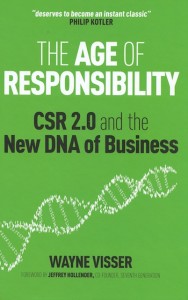 If we expect the right to fair treatment, we have a responsibility to respect the rule of law and honour the principle of reciprocity. If we believe in the right to have our basic needs met, we have the responsibility to respond when poverty denies those rights to others.
If we expect the right to fair treatment, we have a responsibility to respect the rule of law and honour the principle of reciprocity. If we believe in the right to have our basic needs met, we have the responsibility to respond when poverty denies those rights to others.
Taking responsibility, at home or in the workplace, is an expression of confidence in our own abilities, a chance to test our own limits, to challenge ourselves and to see how far we can go. Responsibility is the gateway to achievement. And achievement is the path to growth. Being responsible for something means that we are entrusted with realising its potential, turning its promise into reality. We are the magicians of manifestation, ready to prove to ourselves and to others what can happen when we put our minds to it, if we focus our energies and concentrate our efforts.
Being responsible for someone – another person – is an even greater privilege, for it means that we are embracing our role as caregivers, helping others to develop and flourish. This is an awesome responsibility, in the truest sense, one which should be embraced with gratitude, not reluctantly accepted with trepidation. Responsibility asks no more of us than that we try our best, that we act in the highest and truest way we know. Responsibility is not a guarantee of success, but a commitment to trying.
So why is responsibility seen by many as such an onerous burden? …
[button size=”small” color=”blue” style=”download” new_window=”false” link=”http://www.waynevisser.com/wp-content/uploads/2012/03/book_aor_chap1.pdf”]Pdf[/button] The Call to Responsibility (chapter)
[button size=”small” color=”blue” style=”info” new_window=”false” link=”http://www.waynevisser.com/books/the-age-of-responsibility”]Page[/button] The Age of Responsibility (book)
Visser, W. (2011) The Call to Responsibility: Our Ability to Respond, In W. Visser, The Age of Responsibility: CSR 2.0 and the New DNA of Business, London: Wiley.
Chapter by Wayne Visser
Extract from Reframing Corporate Social Responsibility
Quotes
The point is, ladies and gentleman, that greed, for lack of a better word, is good. Greed is right, greed works. Greed clarifies, cuts through, and captures the essence of the evolutionary spirit. Greed, in all of its forms; greed for life, for money, for love, for knowledge has marked the upward surge of mankind. – Gordon Gekko, Wall Street (the movie)
Responsibility is literally what it says – our ability to respond. To be responsible is to be proactive in the world, to be sensitive to the interconnections, and to be willing to do something constructive as a way of giving back. Responsibility is the footprints we leave in the sand, the mark of our passage. What tracks will you leave? -Wayne Visser, Business Frontiers (the book)
Abstract
The 1987 movie Wall Street and our recent global financial crisis (GFC), despite one being fictional and the other painfully real, tell a common story. Over the past few decades, we have been living through an Age of Greed, characterised by a colossal failure of corporate responsibility and corruption of individual morality. This Crisis of Responsibility has had catastrophic consequences for the global economy, bankrupting whole economies (like Iceland) and wreaking havoc with the lives of ordinary citizens around the world, many of whom are now without a job and without a roof over their heads.
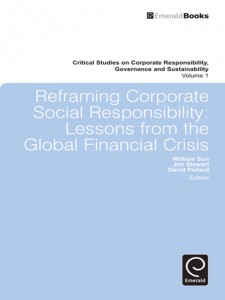
In this chapter, I want to explore the ways in which the GFC represents a multi-level failure of responsibility – from the individual and corporate level to the finance sector and entire capitalist system. I will also examine the impact of the GFC on what is traditionally viewed as corporate social responsibility (CSR). To conclude, I will set out my conviction
that unless CSR itself is fundamentally transformed, into CSR 2.0, it will do nothing to prevent an equally (if not more) devastating Crisis of Responsibility from recurring in future.
The Age of Greed
Gordon Gekko’s words, although spoken by a fictitious character of Oliver Stone’s imagination, captures the spirit of a very real age: the Age of Greed. This was an age that, in my view, began when the first financial derivatives were traded on the Chicago Mercantile Exchange in 1972 and ended (we hope) with Lehman’s collapse in 2008. It was a time when ‘greed is good’ and ‘bigger is better’ were the dual-mottos that seemed to underpin the American Dream. The invisible hand of the market went unquestioned. Incentives – like Wall Street profits and traders’ bonuses – were perverse, leading not only to unbelievable wealth in the hands of a few speculators, but ultimately to global financial catastrophe.
The story of Gordon Gekko (and his modern day real-life equivalents like Richard Fuld, the captain of the titanic Lehmans before it hit the iceberg) gets to the heart of the nature of greed …
[button size=”small” color=”blue” style=”download” new_window=”false” link=”http://www.waynevisser.com/wp-content/uploads/2012/04/chapter_wvisser_age_responsibility.pdf”]Pdf[/button] CSR 2.0: Beyond the Age of Greed (chapter)
[button size=”small” color=”blue” style=”info” new_window=”false” link=”http://www.waynevisser.com/books/the-age-of-responsibility”]Page[/button] The Age of Responsibility (book)
Visser, W. (2010) CSR 2.0: From the Age of Greed to the Age of Responsibility, In W. Sun, et al. (eds.), Reframing Corporate Social Responsibility: Lessons from the Global Financial Crisis. Bingley: Emerald.
Chapter by Wayne Visser
Extract from Responsible Business
The Rise and Fall of CSR
Corporate social responsibility (CSR) has been debated and practiced in one form or another for more than 4,000 years. For example, the ancient Vedic and Sutra texts of Hinduism and the Jatakas of Buddhism include ethical admonitions on usury (the charging of excessive interest) and Islam has long advocated Zakat, or a wealth taxi.
The modern concept of CSR can be more clearly traced to the mid-to-late 1800s, with industrialists like John H. Patterson of National Cash Register seeding the industrial welfare movement and philanthropists like John D. Rockerfeller setting a charitable precedent that we see echoed more than a hundred years later with the likes of Bill Gatesii.
Despite these early variations, CSR only entered the popular lexicon in the 1950s with R. Bowen’s landmark book, Social Responsibilities of the Businessmaniii. The concept was challenged and strengthened in the 1960s with the birth of the environmental movement, following Rachel Carson’s critique of the chemicals industry in Silent Springiv, and the consumer movement off the back of Ralph Nader’s social activism, most famously over General Motors’s safety recordv.
The 1970s saw the first widely accepted definition of CSR emerge – Archie Carroll’s 4-part concept of economic, legal, ethical and philanthropic responsibilities, later depicted as a CSR pyramidvi – as well as the first CSR code, the Sullivan Principles. The 1980s brought the application of quality management to occupational health and safety and the introduction of CSR codes like Responsible Care.
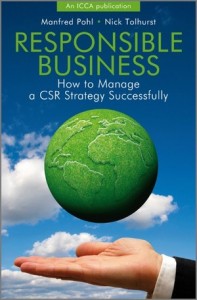
In the 1990s, CSR was institutionalised with standards like ISO 14001 and SA 8000, guidelines like GRI and corporate governance codes like Cadbury and King. The 21st century has been mostly more of the same, spawning a plethora of CSR guidelines, codes and standards (there are more than 100 listed in The A to Z of Corporate Social Responsibility), with industry sector and climate change variations on the theme.
Why is all this potted history of CSR important in a discussion about the future? Well, first, it is to realise that CSR is a dynamic movement that has been evolving over decades, if not centuries. But second, and perhaps more importantly, it is to acknowledge that, despite this seemingly impressive steady march of progress, CSR has failed. Furthermore, we are witnessing the decline of CSR, which will continue until its natural death, unless it is reborn and rejuvenated.
That is a bold claim, so it deserves substantiation. CSR has undoubtedly had many positive impacts, for communities and the environment. Yet, its success or failure should be judged in the context of the total impacts of business on society and the planet. Viewed this way, on virtually every measure of social, ecological and ethical performance we have available, the negative impacts of business have been an unmitigated disaster, which CSR has completely failed to avert or even substantially moderate.
A few facts will suffice to make the point …
[button size=”small” color=”blue” style=”download” new_window=”false” link=”http://www.waynevisser.com/wp-content/uploads/2012/04/chapter_wvisser_csr_2_0.pdf”]Pdf[/button] CSR 2.0: Evolution and Revolution (chapter)
[button size=”small” color=”blue” style=”info” new_window=”false” link=”http://www.waynevisser.com/books/the-age-of-responsibility”]Page[/button] The Age of Responsibility (book)
Visser, W. (2010) CSR 2.0: The Evolution and Revolution of Corporate Social Responsibility, In M. Pohl & N. Tolhurst (eds.), Responsible Business: How to Manage a CSR Strategy Successfully. Wiley.
Chapter by Wayne Visser
Extract from The Top 50 Sustainability Books
Key Ideas
Synopsis
When Corporations Rule the World suggests that the promises of the global economy are based on a number of myths: that growth in GNP is a valid measure of human well-being and progress; that free unregulated markets efficiently allocate a society’s resources; that growth in trade benefits ordinary people; that economic globalization is inevitable; that global corporations are benevolent institutions that if freed from governmental interference will provide a clean environment for all and good jobs for the poor; and that absentee investors create local prosperity.
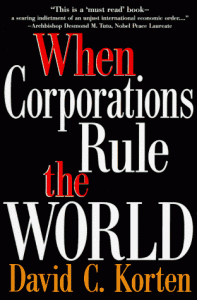 Korten believes that these myths are finally being unmasked and challenged by an Ecological Revolution that calls us “to reclaim our political power and rediscover our spirituality to create societies that nurture our ability and desire to embrace the joyful experience of living to its fullest.” He argues that instead of concentrating on increasing economic growth and GDP, we should concentrate on ending poverty, improving our quality of life, and achieving a sustainable balance with the Earth.
Korten believes that these myths are finally being unmasked and challenged by an Ecological Revolution that calls us “to reclaim our political power and rediscover our spirituality to create societies that nurture our ability and desire to embrace the joyful experience of living to its fullest.” He argues that instead of concentrating on increasing economic growth and GDP, we should concentrate on ending poverty, improving our quality of life, and achieving a sustainable balance with the Earth.
In order to achieve this goal of “sustainable well-being for all people”, Korten believes that we need a multilevel system of nested economies with the household as the basic economic unit, up through successive geographical aggregations to localities, districts, nations, and regions. Each level would seek to function as an integrated, self-reliant, self-managing political, economic and ecological community.
A corporations of the future needs to show that it is “committed to investing in the future; providing employees with secure, well-paying jobs; paying a fair share of local taxes; paying into a fully funded retirement trust fund; managing environmental resources responsibly; and other wise managing for the long-term human interest. Such companies are a valuable community asset, and in a healthy economy, they pay their shareholders solid and reliable – but not extravagant – dividends over the long term.”
The Guiding Principles for an Ecological Revolution include environmental sustainability, economic justice, biological and cultural diversity, subsidiarity (where the economy serves human needs, not the needs of money, corporations or governments), intrinsic responsibility (internalising externalities), and common heritage (of the planet’s environmental resources and the accumulated human knowledge) …
[button size=”small” color=”blue” style=”download” new_window=”false” link=”http://www.waynevisser.com/wp-content/uploads/2012/04/book_top50_chap20_korten.pdf”]Pdf[/button] When Corporations Rule the World (chapter)
[button size=”small” color=”blue” style=”info” new_window=”false” link=”http://www.waynevisser.com/books/the-top-50-sustainability-books”]Page[/button] The Top 50 Sustainability Books (book)
Visser, W. (2009) When Corporations Rule the World, In W. Visser & Cambridge Programme for Sustainability Leadership, The Top 50 Sustainability Books, Sheffield: Greenleaf.
Chapter by Wayne Visser
Extract from Landmarks for Sustainability
Quotes
I worry about climate change. It’s the only thing that I believe has the power to fundamentally end the march of civilization as we know it, and make a lot of the other efforts that we’re making irrelevant and impossible – Bill Clinton, former US President
Climate change is the most severe problem that we are facing today, more serious even than the threat of terrorism” – Sir David King, former UK government chief scientific adviser
Climate change: It’s here. If we don’t react, war, pestilence and famine will follow close behind – R K Pachauri, Chairman, Intergovernmental Panel on Climate Change (IPCC)
If we follow business as usual I can’t see how west Antarctica could survive a century. We are talking about a sea-level rise of at least a couple of metres this century … What we have found is that the target we have all been aiming for is a disaster – a guaranteed disaster – James Hansen, US climate scientist and head of Head of NASA Goddard Institute for Space Studies
Our “large-scale geophysical experiment” …
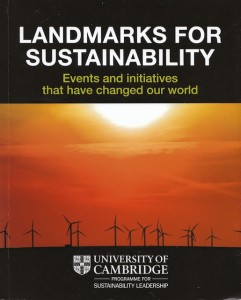 Scientists have long been aware of the earth’s extreme temperature variations, with the last major ice age ending about 10,000 years ago. However, in 1824 Jean-Baptiste Fourier discovered a global warming (or greenhouse) effect, and in 1861, the Irish physicist John Tyndall carried out key research on carbon dioxide (CO2) and heat absorption.
Scientists have long been aware of the earth’s extreme temperature variations, with the last major ice age ending about 10,000 years ago. However, in 1824 Jean-Baptiste Fourier discovered a global warming (or greenhouse) effect, and in 1861, the Irish physicist John Tyndall carried out key research on carbon dioxide (CO2) and heat absorption.
In 1896, Swedish and American scientists independently concluded that CO2 was the likely cause of global warming. By 1957, US oceanographer Roger Revelle was warning that humanity is conducting a “large-scale geophysical experiment”, while colleague David Keeling set up the first continuous monitoring of CO2 in the atmosphere, confirming year-on-year-rises.
Despite these early signs, it took until 1979 for the first World Climate Conference, organised by the World Meteorological Organisation (WMO), to state that “continued expansion of man’s activities on earth may cause significant extended regional and even global changes of climate”. This led WMO and the United Nations Environment Programme (UNEP) to establish a scientific advisory body – the Intergovernmental Panel on Climate Change (IPCC).
The IPCC issued its First Assessment Report in 1990, finding that the planet had warmed by 0.5°C in the past century and would rise further by 0.3°C per decade in the 21st century, accompanied by global mean sea level rises of 6 cm per decade. Convinced that the world needed a global policy response, the UN established the Framework Convention on Climate Change (UNFCCC), which 154 nations (including the US) signed at the Rio “Earth Summit” in 1992.
In 1995, the IPCC Second Assessment Report confirmed that concentrations of greenhouse gas reductions (GHGs) were continuing to increase, and that the socio-economic impacts of climate change were significant, while the UNFCCC began negotiations on an international agreement to limit the emission of GHGs. The result was the Kyoto Protocol, adopted in 1997, which: 1) set mandatory targets for emission reductions for the world’s 38 leading economies, and 2) proposed three flexible market mechanisms for achieving these reductions through carbon trading. The targets collectively amounted to a 5.2% global reduction in GHGs from these countries against 1990 levels by 2012.
Despite US opposition to the Protocol, momentum continued to build, with the EU launching its Emissions Trading Scheme for CO2 in 2005. In 2007, the UK’s Stern Review, prepared by former World Bank Chief Economist Sir Nicholas Stern, warned that tackling climate change will cost around 1% of global GDP, whereas the cost of not acting could be between 5% and 20%. Shortly thereafter, the IPCC released its 4th Assessment Report, concluding with 90% confidence that human activity is causing climate change. It seemed the tide was turning, in no small part thanks to former US Vice-President Al Gore, who received an Oscar for his movie, An Inconvenient Truth, and a Nobel Prize, shared with IPCC. This seemed to mark the end of denial and the beginning of urgent global action on climate change …
[button size=”small” color=”blue” style=”download” new_window=”false” link=”http://www.waynevisser.com/wp-content/uploads/2012/04/book_landmarks_chap3_climate.pdf”]Pdf[/button] Our Geophysical Experiment (chapter)
[button size=”small” color=”blue” style=”info” new_window=”false” link=”http://www.waynevisser.com/books/landmarks-for-sustainability”]Page[/button] Landmarks for Sustainability (book)
Visser, W. (2009) Climate Change, In W. Visser & Cambridge Programme for Sustainability Leadership, Landmarks for Sustainability: Events and Initiatives That Have Changed the World, Sheffield: Greenleaf.
Chapter by Wayne Visser
Extract from Making a Difference
Chapter Objectives
For the purposes of my research, “typology of meaning” refers to the classification of typical sources of meaning derived by sustainability managers in their work into four types, each associated with distinctive roles within the organisation.
Introducing the Typology
The typology grew out of a realisation that four of the six sources of meaning in the work of sustainability managers were strongly related to organisational roles. The typology was included in the Sustainability Managers Research Model (Figure 4.1) that was presented to participants in the Phase 3 follow up interviews and received positive feedback. This section will introduce the four types that I identified, as well as the dynamics of the model.
The Four Types
We can begin by identifying the four types: Expert, Facilitator, Catalyst and Activist. Each type represents a constellation of meaning. It is expected that any individual sustainability manager will embody elements of all of these types, but that the relative influence of each category will differ per individual. Hence, the dominant type can be thought of as a centre of gravity for meaning in the sustainability managers’ work, i.e. the mode of operating in which they feel most comfortable, fulfilled or satisfied.
We can visually represent the idea that people derive meaning from a variety of sources by showing the types as boxes in four quadrants. The relative size of the shaded boxes simply indicates how much meaning the individual derives from each type. Hence, in the case depicted, the individual is perfectly balanced, showing equal preference for each of the types.
An Expert derives relatively more meaning from the constellation of characteristics associated with this type.
There is considerable overlap between the Expert type and specialist input as a source of meaning in work (Chapter 6). Therefore, rather than repeat the illustrative quotations from the interviews in full, Table 8.1 presents typical statements and phrases indicative of Expert type sustainability managers.
These quotes illustrate some of the themes that characterise the way Experts find their meaning, namely by engaging with projects or systems, giving expert input, focusing on technical excellence, seeking uniqueness through specialisation, and pride in problem solving abilities.
Characteristics of the Expert
[button size=”small” color=”blue” style=”download” new_window=”false” link=”http://www.waynevisser.com/wp-content/uploads/2012/03/book_mad_chap8_typology_of_meaning.pdf”]Pdf[/button] A Typology of Meaning (chapter)
[button size=”small” color=”blue” style=”info” new_window=”false” link=”http://www.controlatest1.co.uk/waynevisser/making-a-difference/”]Page[/button] Making a Difference (book)
Visser, W. (2008) A Typology of Meaning, In Making a Difference: Purpose-Inspired Leadership for Corporate Sustainability and Responsibility, Saarbrücken: VDM, 218-237.
Chapter by Wayne Visser
Extract from The Oxford Handbook of Corporate Social Responsibility
The challenge for corporate social responsibility (CSR) in developing countries is framed by a vision that was distilled in 2000 into the Millennium Development Goals—‘a world with less poverty, hunger and disease, greater survival prospects for mothers and their infants, better educated children, equal opportunities for women, and a healthier environment’ (UN, 2006: 3). Unfortunately, these global aspirations remain far from being met in many developing countries today. The question addressed by this chapter, therefore, is: What is the role of business in tackling the critical issues of human development and environmental sustainability in developing countries?
To begin with, it is worth clarifying my use of the terms developing countries and CSR. There is an extensive historical and generally highly critical debate in the development literature about the classification of countries as developed and less developed or developing. Without reviving that debate here, suffice to say that I use developing countries because it is still a popular term used to collectively describe nations that have relatively lower per capita incomes and are relatively less industrialized.
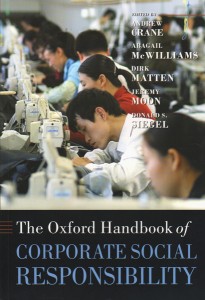
This is consistent with the United Nations Developments Program’s (2006) categorization in its summary statistics on human development and is best represented by theWorld Bank’s classification of lower and middle income countries. It should be noted, however, that the UNDP’s classification of high, medium and low development countries produces a slightly different picture than the World Bank’s list of which countries are developed and developing.
CSR is an equally contested concept (Moon, 2002b). However, for the purposes of this chapter, I use CSR in developing countries to represent ‘the formal and informal ways in which business makes a contribution to improving the governance, social, ethical, labour and environmental conditions of the developing countries in which they operate, while remaining sensitive to prevailing religious, historical and cultural contexts’ (Visser et al., 2007).
The rationale for focusing on CSR in developing countries as distinct from CSR in the developed world is fourfold:
The latter claim is explored further in the sections which follow and is summarized at the end of the chapter. The chapter begins by proposing different ways to categorize the literature on CSR in developing countries. It then reviews the research which has been conducted at a global and regional level, before considering the main CSR drivers in developing countries. Finally, a model of CSR in developing countries is proposed, before concluding with a summary and recommendations for future research …
[button size=”small” color=”blue” style=”download” new_window=”false” link=”http://www.waynevisser.com/wp-content/uploads/2012/04/chapter_wvisser_csr_dev_countries.pdf”]Pdf[/button] CSR in Developing Countries (chapter)
[button size=”small” color=”blue” style=”info” new_window=”false” link=”http://www.waynevisser.com/books/corporate-citizenship-in-africa”]Page[/button] Corporate Citizenship in Africa (book)
[button size=”small” color=”blue” style=”info” new_window=”false” link=”http://www.waynevisser.com/books/the-world-guide-to-csr”]Page[/button] The World Guide to CSR (book)
Visser, W. (2008) Corporate Social Responsibility in Developing Countries, In A. Crane, A. McWilliams, D. Matten, J. Moon & D. Siegel (eds.), The Oxford Handbook of Corporate Social Responsibility, Oxford: Oxford University Press, 473-479.
Chapter by Wayne Visser
Extract from The A to Z of Corporate Social Responsibility
CSR in developing countries incorporates the formal and informal ways in which business makes a contribution to improving the governance, social, ethical, labour and environmental conditions of the developing countries in which they operate, while remaining sensitive to prevailing religious, historical and cultural contexts.
The category of ‘developing countries’ is used broadly to include countries that have relatively lower per capita incomes and are less industrialised. For a listing of countries that might fall into this grouping, see the World Bank’s classification of lower and middle income countries.
Far from being a unified field, debate on CSR in developing countries is extremely diverse, ranging from optimistic views about the role of business in society to highly critical perspectives. However, there seems to be an emerging consensus that developing countries provide a socio-economic and cultural context for CSR which is, in many ways, different from developed countries.
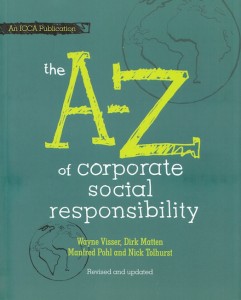 In particular, CSR in developing countries has the following distinctive characteristics:
In particular, CSR in developing countries has the following distinctive characteristics:
The drivers for CSR in developing countries include …
[button size=”small” color=”blue” style=”download” new_window=”false” link=”http://www.waynevisser.com/wp-content/uploads/2012/03/book_csr_entry_developing_countries.pdf”]Pdf[/button] Developing Countries (chapter)
[button size=”small” color=”blue” style=”info” new_window=”false” link=”http://www.waynevisser.com/books/the-a-to-z-of-corporate-social-responsibility”]Page[/button] The A to Z of Corporate Social Responsibility (book)
Visser, W. (2007) Developing Countries, In W. Visser, D. Matten, M. Pohl & N. Tolhurst (eds.), The A to Z of Corporate Social Responsibility, London: Wiley, 154-157.
Chapter by Wayne Visser
Extract from Corporate Citizenship in Africa
This paper provides a brief analysis of Hence, there is great scope for expanding the amount of research on corporate citizenship in Africa, as well as improving the diversity of its content and its geographic coverage.
Introduction
Corporate citizenship in Africa is a critical area of scholarly enquiry, driven by the legacy of colonialism and apartheid, the human needs of the continent in the face of widespread poverty, and the trend towards improved social responsibility by multinationals in a globalising economy. Despite this growing importance, however, very little research has been done on corporate citizenship in Africa. In his introduction to the Business Ethics: A European Review special issue on Africa, Rossouw (2000) claims that “the first signs of academic life in business ethics on the African continent can be traced back to the 1980s” (225), but concedes that it remains fragmented and limited.
One of the reasons that this academic discourse is both interesting and important is that corporate citizenship in Africa has its own unique features, distinctive from other regions in the world. Rossouw (2000) suggests three areas that characterise business ethics in Africa: 1) On the macro-level, the influence of Africa’s colonial and neo-colonial past; 2) On the meso-level, the moral responsibility of business towards the reconstruction of African societies; and 3) On the micro-level, the way in which individual businesses deal with affirmative action to overcome the consequences of historical racism, sexism and economic exclusion.
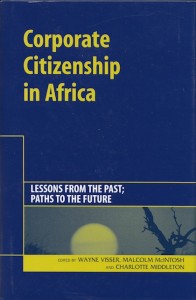
Visser (2005) argues that, in terms of Carroll’s (1991) pyramid model of corporate social responsibility, in which the layers denote relative emphasis assigned to various responsibilities, Africa exhibits a different ordering to the classic model. Specifically, economic responsibilities still get the most emphasis, but philanthropy is given second highest priority (as opposed to legal responsibilities in the classic Carroll pyramid), followed by legal (as opposed to ethical) and then ethical (as opposed to philanthropic) responsibilities. Furthermore, he suggests that, given the ethical dilemmas faced by companies in Africa, a more dynamic and sophisticated model of corporate responsibility may be more appropriate, such as one drawing on complexity theory (McIntosh 2003).
In the first study of business ethics as an academic field in Africa, Barkhuysen and Rossouw (2000) found 77 courses and seven centres located in six countries, namely Egypt, Ghana, Kenya, Nigeria, South Africa and Uganda. Furthermore, they identified 167 relevant publications, including 130 articles and 26 books. The majority of articles were written by South African authors, followed by authors residing outside Africa, as well as some from Kenya, Uganda and Nigeria. The content was heavily focused on descriptive and normative ethical issues.
In a review of academic research on corporate citizenship in South Africa, Visser (2005) found that, of the pre-1994 publications, most deal with the ethical investment issues relating to apartheid, while, of the post-1994 articles, many focus on the individual ethics of South African managers. Other areas of focus have included specific South African sectors (most notably mining and chemicals), socially responsible investment, stakeholder theory, small and medium sized enterprises, corporate environmental management, sustainability reporting, corporate governance, and general CC corporate citizenship …
[button size=”small” color=”blue” style=”download” new_window=”false” link=”http://www.waynevisser.com/wp-content/uploads/2012/04/chapter_wvisser_research_cc_africa.pdf”]Pdf[/button] CSR Research in Africa (chapter)
[button size=”small” color=”blue” style=”info” new_window=”false” link=”http://www.waynevisser.com/books/corporate-citizenship-in-africa”]Page[/button] Corporate Citizenship in Africa (book)
Visser, W. (2006) Research on Corporate Citizenship in Africa: A Ten-year Review (1995-2005), In W. Visser, M. McIntosh & C. Middleton (eds.), Corporate Citizenship in Africa: Lessons from the Past; Paths to the Future, Sheffield: Greenleaf, 18-28.